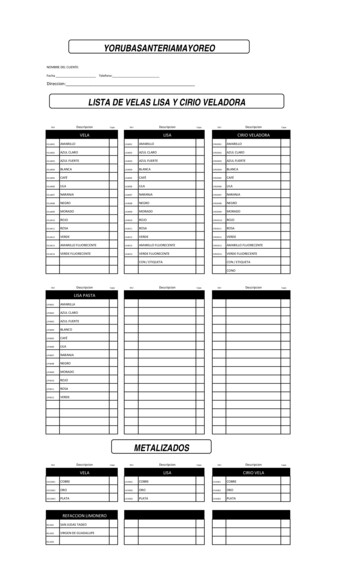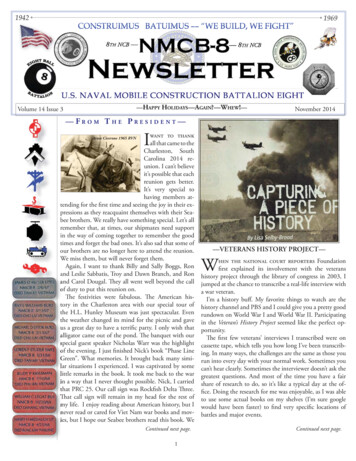
Transcription
Lisa Mojsin, M.A.Director, Accurate English, Inc.Los Angeles, CA
AcknowledgmentsThis book is dedicated to my accent reduction students who came to the United Statesfrom all parts of the globe. Their drive to excel, passion for learning, amazing workethic, and belief in the American dream have inspired me to write this book. In thewords of Henry David Thoreau, “Go confidently in the direction of your dreams. Livethe life you have imagined.”Thanks to all of the supportive and extremely professional people at Barron’s: DimitryPopow, my editor; Wayne Barr for seeking me out to write this book; and VeronicaDouglas for her support.I am enormously grateful to Lou Savage, “The Voice.” His is the beautiful male voiceon the recordings. He was also responsible for all of the expert audio engineering andaudio editing. Thank you, Lou, for being such a perfectionist with the sound and insisting on fixing the audio “mistakes” I couldn’t hear anyway.I am also grateful for the contributions of Maryam Meghan, Jack Cumming, KatarinaMatolek, Mauricio Sanchez, Sabrina Stoll, Sonya Kahn, Jennie Lo, Yvette Basica,Marc Basica, and Laura Tien. Copyright 2009 by Barron’s Educational Series, Inc.All rights reserved. No part of this publication may be reproduced or distributed inany form or by any means without the written permission of the copyright owner.Address all inquiries to:Barron’s Educational Series, Inc.250 Wireless BoulevardHauppauge, NY 11788www.barronseduc.comISBN-13: 978-0-7641-4185-0 (book only)ISBN-10: 0-7641-4185-6 (book only)ISBN-13: 978-0-7641-9582-2 (book & CD package)ISBN-10: 0-7641-9582-4 (book & CD package)Library of Congress Control Number 2008938576Printed in the United States of America987654321
ContentsIntroduction viChapter 1: The Vowel Sounds 1Main Vowel Sounds of American English 1Production of Vowels 2/i/ as in meet 3/I/ as in sit 3/eɪ/ as in take 5/ɛ/ as in get 6/ae/ as in fat 7/ɑ/ as in father 8/ɘ/ as in fun 9/ɔ/as in saw 10/oʊ/ as in boat 12/ʊ/ as in good 13/u/ as in too 13/ɘr/ as in bird 15/aɪ/ as in time 15/aʊ/ as in house 16/ɔɪ/ as in boy 17Chapter 2: Vowels in Detail 18Review of /I/ and /i/ Sounds 18Review of /ɛ/ and /æ/ Sounds 19Review of /ɘ/, /ɑ/, /ɔ/, and /ou/ Sounds 20The Problematic o 21The American /ɔ/ Sound 23Review of /ɛ/, /æ/, /ɑ/, /ɔ/, /ɘ/, and /oʊ/ 25Review of /ʊ/ and /u/ Sounds 25Comparing /u/ and /yu/ 26Review of the /ɘr/ Sound 27Vowels Followed by the /r/ Sound 27Chapter 3: Consonants 29Forming American Consonants 29Voiceless and Voiced Consonants 30Vowel Length and Voiced and Voiceless Consonants 31Stops and Continuants 33Chapter 4: Problematic Consonants 34The Various t Sounds of American English 34The “Fast d” Sound 38The /tʃr/ Sound: tr 39The /dʒr/ Sound: dr 39The /dʒ/ Sound: du and d y 40The /tʃ/ Sound: tu and t y 40iii
Words Ending in -ed 41The th Sound 44The American /r/ 48The American /l/ 50Understanding /l/ Versus /r/ 52The /v/ Sound 54Understanding /b/ Versus /v/ 55The /w/ Sound 56Understanding /v/ Versus /w/ 58The /s/ and /z/ Sounds 59The /ŋg/ Sound: Pronouncing ng 62Consonant Clusters 63Chapter 5: Syllable Stress 66Stressed and Reduced Vowels 66Dangers of Stressing the Wrong Syllable 68General Rules for Stress Placement 69Two-Syllable Words 69Noun and Verb Pairs 70Words Ending in -tion and -ate 71-ate Endings of Verbs and Nouns 71More Stressed Suffixes 72Rules for Prefixes 72Syllable Stress Changes 74Reduced Vowels for Review 76Chapter 6: Word Stress 78Compound Nouns 78Proper Stress with Adjectives 80Phrasal Verbs 81Noun Forms of Phrasal Verbs 82Abbreviations and Numbers 83Names of Places and People 83Word Stress Within a Sentence 84Lengthening the Main Vowel in Stressed Words 84Which Words Should I Stress? 85Content Words 85Content Words in Detail: Verbs 86Stress Nouns but Not Pronouns 87Content Words in Detail: Adjectives 87Reducing Vowels in Unstressed Words 88Weak Forms 89Strong Forms 90Thought Groups and Focus Words 91Contrastive Stress 92Chapter 7: Intonation 95Falling Intonation 95Statements 95Questions 95iv
Rising Intonation 96Non-Final Intonation 97Unfinished Thoughts 97Introductory Words 98Series of Words 98Expressing Choices 98Wavering Intonation 99Chapter 8: Sound Like a True Native Speaker 101Linking Words for Smoother Speech Flow 101Rules for Linking 102Linking Consonant to Vowel 102Linking Consonant to Same Consonant 103Final Stop Between Consonants 104Linking Vowel to Vowel 104Linking Vowels Within a Word 105Reducing Pronouns 107Contractions 108Commonly Contracted Words 109Conditional Tense and Contractions 113Casual Versus Formal Speech 115Rules and Patterns of Casual Speech 116Commonly Confused Words 118Chapter 9: Memorizing the Exceptions 119Same Spelling, Different Pronunciation 119Two Correct Pronunciations 120Especially Difficult Words 121Words with Dropped Syllables 123Words with Silent Letters 124Homophones 125Native Language Guide 127Chinese 127Farsi 135Filipino Languages 138French 141German 146Indian Languages 150Indonesian 154Japanese 158Korean 162Portuguese 166Russian 170Spanish 174Vietnamese 179Index 184v
CD 1Track1IntroductionThis book will help non-native speakers of English learn to speak with an American accent.Which American Accent Will This Book Teach Me?You will learn to produce the standard American accent. Some people also call it “broadcaster English.” It’s the kind of standard, neutral speech that you hear on CNN and in educated circles. It’s a non-regional American accent, meaning that people do not associate thedialect with any particular part of the United States. It is the accent most commonly associated with educated people in the American East, Midwest, and West.How Should I Practice?Listen to the recorded material over and over. You will hear words and sentences pronouncedfollowed by a pause for you to repeat after the speaker. You may want to record yourselfrepeating so that you can compare your accent to the accents of the speakers on this audio.Then practice the new sounds in real-life situations.There are numerous study tips throughout the book, both from the writer and from hermany successful students who have greatly improved their American accent. For an individual professional analysis of your accent which will help you to study accent reductionmore efficiently and tell you which sections of this book you should focus on most, pleasecontact us at 1-800-871-1317 or visit our website at: masteringtheamericanaccent.com.viMastering the American Accent
CD 1Track2Chapter OneTHE VOWEL SOUNDSIn this chapter you will learn how to accurately pronounce all of the main American Englishvowel sounds. The English alphabet has five vowels, a, e, i, o and u, but it has about 15 mainvowel sounds. For some learners this is one of the most difficult aspects of American English tomaster. Speakers of languages with fewer vowel sounds are likely to speak English using onlythe same number of sounds that exist in their native language. Sometimes they do not evenhear the distinction between certain sounds in English. Consequently, non-native speakersmight pronounce “hill” and “heal” the same way. Similarly, the words sell and sale, or cup, cop,and cap may also sound the same when spoken by a non-native speaker.Because there is not always a direct relationship between how a word is spelled and how itis pronounced, you should become familiar with the phonetic symbols that represent thesounds that you are learning. This way, you will be able to use your dictionary when youcome across a word that contains a vowel sound that you don’t know how to pronounce.Make sure you also become familiar with the phonetic symbols of your dictionary as theymay be a bit different from the symbols that this book uses.Main Vowel Sounds ofAmerican EnglishCD 1Track31. /i/read, heat, meet, seat, seen, feetPlease eat the meat and the cheese beforeyou leave.2. /ɪ/in, bit, this, give, sister, will, cityMy sister Linda will live in the big city.3. /eɪ/late, gate, bait, fail, main, braid, waitJane’s face looks great for her age ofeighty-eight.4. /ɛ/let, get, end, any, fell, bread, men, saidI went to Texas for my friend’s wedding.5. /æ/last, apple, add, can, answer, classThe handsome man lost his baggage afterhis travels.6. /ɑ/stop, lock, farm, want, army, possible,gotJohn is positive that his car was parked inthat lot.7. /ɘ/come, up, jump, but, does, love, money,aboutYour younger brother doesn’t trust us, doeshe?Chapter One: THE VOWEL SOUNDS1
CD 1Track48. /ɔ/all, fall, author, also, applaud, thought,foughtPaula was doing laundry all day long.9. /oʊ/go, slow, so, those, post, moment, droveOh, no! Don’t open the window, it’s cold.10. /ʊ/look, took, put, foot, full, wolf, cookieHe would read the good book if he could.11. /u/cool, soup, moon, boot, tooth, move,trueSue knew about the food in the room.12. /ɘr/her, work, sure, first, early, were, earn,occurWhat were the first words that girl learned?13. /aɪ/time, nine, dry, high, style, five, ChinaI advise you to ride a bicycle in China.14. /aʊ/south, house, cow, found, down, townHe went out of the house for about an hour.15. /ɔɪ/oil, choice, moist, enjoy, avoid, voiceLet’s avoid the annoying noise.Production of VowelsWe categorize vowels as front, middle, or back depending on which part of the tongue isused to produce the sound. For example, /i/ is a front vowel because the front part of thetongue goes up in the front of the mouth, and /u/ is a back vowel because the back of thetongue goes up in the back of the mouth. We also categorize vowels as high or low. In highvowels, the tongue is pushed up high near the roof of the mouth as in /i/, and in low vowels, the tongue is flat down at the bottom of the mouth, as in /ae/.Diphthongs consist of two different vowel sounds that are closely joined together and treatedas one vowel. They are represented by two phonetic symbols. To create this sound, move yourtongue smoothly from one vowel position to another. The following vowels are diphthongs:/eɪ/ as in take, /oʊ/ as in boat, /aɪ/ as in time, /aʊ/ as in house, and /ɔɪ/ as in boy.You will now learn how to correctly pronounce each type of vowel. Refer to the diagramsbelow to help you better understand the correct tongue and lip positions for these variousvowel sounds.iIeiε ræfront2Mastering the American Accentu uαamiddlebackc
/i/ AS IN MEETCD 1Track5A thief believes everybody steals.E.W. HoweLips: Slightly smiling, tense, not rounded.Tongue: Tense, high and far forward near the roof of the mouth.Common Spelling Patterns for /i/1. ee2. ea3. ie and ei4. final e5. e consonant e6. final y7. endings with iquemeet, feel, see, freeteam, reach, mean, seabelief, piece, neither, receiveme, we, she, hethese, Chinese, Petercity, duty, country, abilityunique, boutique, critiqueCD 1Track6Word Pairs for Practice1. deep sea2. beans and cheese3. severe heat4. breathe deep5. three meals6.7.8.9.10.green leavesextremely easysweet dreamspeaches and creamspeak ChineseCD 1Track7Practice Sentences1. The employees agreed to meet at eight fifteen.2. Don’t keep the TV near the heater.3. It’s extremely easy to cheat when the teacher isn’t here.4. Please speak to Peter about the employee meeting.5. Steve will reread the email before he leaves.CD 1Track8/I/ AS IN SITIn the middle of a difficulty lies opportunity.Albert EinsteinLips: Slightly parted, relaxed.Tongue: Relaxed, high, but not as high as for /i/. Sides of the tongue touchupper back teeth.Chapter One: THE VOWEL SOUNDS3
Common Spelling Patterns for / I /1. i (most common)2. ui3. y between two consonantsexceptions:beenin American English been is pronounced the sameas bin, but in British English been sounds like bean.womenCD 1Track9sounds like wimin (the o is an /I/ sound)Word Pairs for Practice1. big city2. innocent victim3. drink milk4. children’s film5. simple livingCD 1Track10sit, give, this, dinnerbuild, quit, quick, guiltysystem, gym, symbol, hymn6.7.8.9.10.fish and chipstrip to Italyspring picnicthis thingwinter windPractice Sentences1. Kim will visit her big sister Linda in Virginia.2. In the beginning it was difficult for Jim to quit drinking.3. The Smiths invited him to an informal dinner.4. This city has an interesting history.5. When did Bill Clinton visit the Middle East?CD 1Track11Quick ReviewWord Contrasts for /i/ Versus /I/Make sure you don't pronounce these pairs of words the p/I/livefilllisthisslipchipMastering the American /I/bitstillitchsickfitship
Word Pairs for PracticeCD 1Track12Make sure the two words in each pair are pronounced with different vowel sounds.1. still sleepy2. very interesting3. feeling ill4. it’s easy5. is he?6.7.8.9.10.big dealthese thingsMiddle Eastlittle mealgreen pillCD 1Track13/eɪ/ AS IN TAKETake time for all things: great haste makes great waste.Benjamin FranklinLips: Not rounded, relaxed.Tongue: Tense, moves from the mid-high to high position.Common Spelling Patterns for /ei/1. a consonant e2. ai3. ay4. ey5. eigh6. alate, came, take, saverain, wait, pain, aimsay, away, play, Mondaythey, survey, obeyweigh, eight, neighbor, freightless common:April, alien, angelCD 1Track14Word Pairs for Practice1. the same day2. stay away3. escape from jail4. take a break5. stay the same6.7.8.9.10.explain the situationplay baseballeighty-eightbake a cakesave the whalesCD 1Track15Practice Sentences1. She complained about her weight but ate the cake anyway.2. Jake hates waiting for trains and planes.3. It rains and hails in April and May.4. I will stay in the game even though it’s late.5. My neighbor from Spain moved away today.Chapter One: THE VOWEL SOUNDS5
CD 1Track16/ɛ/ AS IN GETEvery exit is an entry somewhere.Tom StoppardLips: Farther apart than for /eɪ/ and relaxed.Tongue: Relaxed, mid-high position.Common Spelling Patterns for /ɛ/1. e2. eaget, end, next, generalheavy, head, read, measureexceptions:said, says again, against, any, manyWarning: Common MistakeThe verb say is pronounced with the /ɛ/ sound inthe past tense form and in the present tense formwhen it is followed by an s.CD 1Track17/eɪ//ɛ/I sayI saidhe saysWord Pairs for Practice1. presidential election2. bend your legs3. plenty of energy4. remember the pledge5. better friendCD 1Track186.7.8.9.10.heavy metalget betterelegant dressnext Wednesdaywell readPractice Sentences1. Without some extra effort you will never excel.2. Jenny and her friend had eggs for breakfast.3. I expect this session to end at ten.4. On the seventh of February the weather was wet.5. I see my best friend Fred every seven days.6Mastering the American Accent
Quick ReviewCD 1Track19Word Contrasts for /ɛ/ Versus /eɪ/Make sure you don’t pronounce these pairs of words the same.1.2.3.4./ɛ/ and /eɪ/penpainsellsailwetwaitwestwaste5.6.7.8./ɛ/ and /eɪ/telltailEdaidtesttastemenmainCD 1Track20Word Pairs for PracticeMake sure the two words in each pair are pronounced with different vowel sounds.1. less rain2. taste test3. neck pain4. fell away5.6.7.8.wet daymain mengreat dressheadacheCD 1Track21/æ/ AS IN FATHe who laughs last laughs best.American proverbLips: Open, not rounded.Tongue: Lowest of all the front vowels. Flat on the floor of the mouth.Common Spelling Patterns for /æ/ahat, apple, man, answerCD 1Track22Word Pairs for Practice1. bad example2. national anthem3. back at the ranch4. accurate answer5. bad habit6.7.8.9.10.practical planannual gatheringlast chancehandsome actorangry manCD 1Track23Practice Sentences1. This is your last chance to give me an accurate answer.2. Sam sat at the back of the math class.3. Danny had a salad and a sandwich in the cafeteria.4. Nancy has a bad attitude in her Spanish class.5. Kathy would rather study acting at the national academy.Chapter One: THE VOWEL SOUNDS7
CD 1Track24Quick ReviewWord Contrasts for /ɛ/ Versus /æ/Make sure you don’t pronounce these pairs of words the same.1.2.3.4.CD siveWord Pairs for PracticeMake sure the two words in each pair are pronounced with different vowel sounds:/ɛ/ or /æ/.1. sad endings2. less land3. angry menCD 1Track264. ten gallons5. last exit6. bad friend/ɑ/ AS IN FATHERNever go to a doctor whose office plants have died.Erma BombeckLips: Apart, as if you are yawning. Not rounded.Tongue: Relaxed, flat at the floor of the mouth.Common Spelling Patterns for /ɑ/oaCD 1Track27CD 1Track28hot, stop, modern, jobfather, watch, dark, wantWord Pairs for Practice1. common problem2. body shop3. occupy the office4. office politics5. from top to bottom6.7.8.9.10.logical responsehot topicmodern hospitalnonstopsloppy jobPractice Sentences1. Ronald is confident that he got the job.2. Scott goes to a lot of rock concerts.3. The doctor operated in the modern hospital.4. Bob will probably lock the office.5. He’s got a lot of dollars in his pocket.8Mastering the American Accent
Quick ReviewCD 1Track29Word Contrasts for /æ/ Versus /ɑ/Make sure you don’t pronounce these pairs of words the g5.6.7.8./æ/capaddracktap/ɑ/copoddrocktopCD 1Track30Word Pairs for PracticeMake sure the two words in each pair are pronounced with different vowel sounds:/æ/ or /ɑ/.1. hot pan2. man’s job3. top answer4. got back5. bad dog6. back pocketCD 1Track31Advice from a Successful Student1B“During my drive to and from work, I always listen to audio books. Thespeaker’s voice is usually very clear and not sloppy like the speech I sometimes hear on the street. I listen closely to the accent of the speaker and tryto imitate it. I play back certain parts over and over again. The more I dothis the better my accent gets.”Katarina Matolek, CroatiaCD 1Track32/ɘ/ AS IN FUN*Love all, trust a few, do wrong to none.William ShakespeareLips: Completely relaxed, slightly parted.Tongue: Relaxed, middle position.Common Spelling Patterns for /ɘ/uooubut, fun, summer, drunklove, done, come, soncousin, country, enough*The IPA (International Phonetic Alphabet) symbol for the stressed vowel is /ʌ/ and for theunstressed vowel it is /ɘ/. They are basically the same sound. Throughout this book the /ɘ/will be used for both. For further study of this reduced, neutral sound, refer to Chapter Five,which deals with syllable stress and reduced vowels.Chapter One: THE VOWEL SOUNDS9
CD 1Track33CD 1Track34Word Pairs for Practice1. young son2. jump up3. fun in the sun4. another subject5. wonderful mother6.7.8.9.10.under the rugnumber oneundercoverenough moneySunday BrunchPractice Sentences1. Your younger brother doesn’t trust us.2. What country does he come from?3. I had another fun summer in London.4. I don’t have much stuff in the trunk of my truck.5. I love the sunny summer months.CD 1Track35Quick ReviewWord Contrasts for /ɑ/ Versus /ɘ/Make sure you don’t pronounce these pairs of words the same.1.2.3.4.CD .8./ɑ/locknonrobberdoll/ɘ/lucknonerubberdullWord Pairs for PracticeMake sure the two words in each pair are pronounced with different vowel sounds:/ɑ/ or /ɘ/.1. come on2. got lucky3. not enough4. cost muchCD 1Track375.6.7.8.fun jobstop runningjump ongunshot/ɔ/ AS IN SAWCourage is the first of human qualities because it is the qualitywhich guarantees all the others.Winston ChurchillLips: Apart, very slightly rounded, oval shape.Tongue: Slightly tense, down near the floor of mouth.10Mastering the American Accent
Common Spelling Patterns for /ɔ/awaualoughtaughtosaw, law, awful, awesomeauthor, August, applaud, auditionsmall, walk, tall, alwaysbought, thought, foughtdaughter, caughtgone, off, longCD 1Track38Word Pairs for Practice1. pause in the hall2. awful thought3. water the lawn4. talk until dawn5. autumn in Austria6.7.8.9.10.walk the dogsmall talkalready exhaustedtall wallcaught the ballCD 1Track39Practice Sentences1. The audience applauded even though the talk was awful.2. His small daughter thought that Santa Claus would come in August.3. I saw your mother-in-law in the mall.4. He bought an automobile at the auction last fall.5. This sauce is awesome, Paula!CD 1Track40Quick ReviewWord Contrasts for /ɘ/ Versus /ɔ/Make sure you don’t pronounce these pairs of words the og/ɘ/5. but6. sung7. cuff8. flood/ɔ/boughtsongcoughflawedCD 1Track41Word Pairs for PracticeMake sure the two words in each pair are pronounced with different vowel sounds:/ɘ/ or /ɔ/.1. another dog2. long month3. much talk4. bought lunch5. coffee cup6. small clubChapter One: THE VOWEL SOUNDS11
CD 1Track42/oʊ/ AS IN BOATNo bird soars too high if he soars with his own wings.William BlakeLips: Very rounded and tense.Tongue: A bit tense, moves from mid to high position.Common Spelling Patterns for /oʊ/ooaowoughno, don’t, home, onlyroad, coat, boatown, slow, windowthough, althoughCD 1Track43Word Pairs for PracticeCD 1Track44Practice Sentences1. phone home2. own a home3. almost over4. open road5. drove slowly6.7.8.9.10.don’t smokelow profileslow motionold poemgolden bowl1. We both hope it’s going to snow.2. Oh, no! Don’t open the window! It’s cold.3. Do you want to go bowling or roller skating?4. I chose a bowl of soup, potatoes, roast beef, and a soda.5. I don’t know if Joan smokes.CD 1Track45Quick ReviewWord Contrasts for /ɑ, ɔ/ Versus /oʊ/Make sure you don’t pronounce these pairs of words the same. Please note that /ɑ/and /ɔ/ sound almost the same, and therefore are both listed in the first column.1.2.3.4.5.12/ɑ, ��tMastering the American Accent6.7.8.9.10./ɑ, ɔ/caughtwalknotgotnon/oʊ/coatwokenotegoatknown
Word Pairs for PracticeMake sure the two words in each pair are pronounced with different vowel sounds:/ɑ, ɔ/ or /oʊ/1. old law2. not home3. those dogsCD 1Track464. odd boat5. walk slowly6. only daughterCD 1Track47/ʊ/ AS IN GOODWithout words, without writing and without books there wouldbe no history, there could be no concept of humanity.Hermann HesseLips: Very slightly rounded.Tongue: Relaxed, back is raised, higher than for /oʊ/.Common Spelling Patterns for /ʊ/oououldexception:good, look, childhood, understoodpush, full, pull, sugarwould, could, shouldwoman sounds like “wumun”CD 1Track48Word Pairs for Practice1. good book2. took a look3. good looking4. fully cooked5. shook his foot6.7.8.9.10.sugar cookiepush and pullwool pulloverwooden hookgood childhoodCD 1Track49Practice Sentences1. Would you help me look for my book?2. The sugar cookies taste good.3. The butcher is a good cook.4. He would read the book if he could.5. Butch visited his old neighborhood in Brooklyn.CD 1Track50/u/ AS IN TOOIf you could choose one characteristic that would get you through life,choose a sense of humor.Jennifer JonesChapter One: THE VOWEL SOUNDS13
Lips: Tense, rounded, as if blowing a balloon.Tongue: Slightly tense, high.Common Spelling Patterns for /u/ooueoewuCD 1Track51CD 1Track52CD 1Track53too, food, school, tooltrue, blue, avenuedo, who, lose, provenew, blew, drewsuper, rule, duty, studentWord Pairs for Practice1. too few2. fruit juice3. soup spoon4. new suit5. true value6.7.8.9.10.blue shoesnew moonsuitable suitcasetwo roomssuper coolPractice Sentences1. The new roof was installed in June.2. I drink fruit juice and eat a lot of soup.3. Your blue shoes are really cool.4. I need proof that you’re telling the truth.5. The statue on the avenue is truly beautiful.Quick ReviewVowel Contrasts for /ʊ/ Versus /u/Make sure you don’t pronounce these pairs of words the same./ʊ/1. full2. lookCD 1Track54/u/foolLuke/ʊ/3. pull4. stood/u/poolstewedWord Pairs for PracticeMake sure the two words in each pair are pronounced with different vowel sounds:/ʊ/ or /u/.1. good food2. full room3. cook stew144. blue book5. two cookies6. too fullMastering the American Accent
/ɘr/ AS IN BIRDCD 1Track55Life is uncertain. Eat dessert first.Ernestine UlmerLips: Slightly rounded.Tongue: Tense, mid-level position. Tip is curled up a bit and pulled back.Common Spelling Patterns for /ɘr/erearirorururearher, mercy, mother, winnerheard, learn, earthfirst, girl, firmdoctor, word, worryoccur, curtain, juryinsecure, culturegrammar, collarCD 1Track56Word Pairs for Practice1. first person2. purple shirt3. learn German4. other world5. serve dinner6.7.8.9.10.third termfirm wordsearly birdnervous girlthirty-thirdPractice SentencesCD 1Track571. I will work during the third term.2. They served turkey for dinner.3. Her purple shirt is dirty.4. She gave birth to a third girl.5. It’s not worth worrying about another birthday.CD 1Track58/aɪ/ AS IN TIMEWe must use time wisely and forever realize that the time is always ripe to do right.Nelson MendelaLips: Open, not rounded, closing a bit when moving to the /ɪ/ position.Tongue: Relaxed, moves from flat to high position.Chapter One: THE VOWEL SOUNDS15
Common Spelling Patterns for /aɪ/yiighieCD 1Track59Word Pairs for Practice1. lime pies2. white wine3. fly a kite4. nice try5. nine livesCD 1Track60fly, sky, apply, stylenice, kind, fine, signlight, fight, sight, nightlie, tie, tried6.7.8.9.10.bright lightfly highsign on the linefine diningninety-ninePractice Sentences1. Why is the price so high for that design?2. The wildfire started on Friday night.3. He was tired after hiking for five hours.4. It’s a nine-hour drive to Iowa.5. We had lime pie and dry white wine.CD 1Track61/aʊ/ AS IN HOUSEIt is better to keep your mouth closed and let people think you are a foolthan to open it and remove all doubt.Mark TwainLips: Start not rounded, but as you move toward /ʊ/, lips begin to close and become tense.Tongue: Moves from relaxed, low to high position for the /ʊ/.Common Spelling Patterns for /aʊ/ouow16Mastering the American Accentfound, loud, around, thousandnow, down, crowd, vowel
Word Pairs for Practice1. about an hour2. crowded house3. downtown4. loud announcement5. countdown6.7.8.9.10.CD 1Track62around the mountainbrown couchfound outdown and outpronounce the vowelPractice SentencesCD 1Track631. I doubt that the clown will say something profound.2. There are flowers all around the house.3. Is that your spouse in the brown blouse?4. The clouds behind the mountain will bring showers.5. The brown cow is near the fountain.CD 1Track64/ɔɪ/ AS IN BOYDon’t worry about avoiding temptation. As you get older, it will avoid you.Winston ChurchillLips: Move from slightly rounded, oval position to relaxed, slightly parted position.Tongue: Relaxed, move from mid-high to high position.Common Spelling Patterns for /ɔɪ/oioyavoid, oil, moist, joinenjoy, toy, employ, royalWord Pairs for Practice1. enjoy the toy6.2. spoiled boy7.3. appointment in Detroit 8.4. broiled oysters9.5. boiling point10.CD 1Track65annoying noisedestroy the poisonloyal employeemoist soilavoid the moistureCD 1Track66Practice Sentences1. He destroyed the poison by flushing it down the toilet.2. Roy had an appointment in Detroit.3. Joyce is annoyed and a little paranoid.4. I was disappointed with Joy’s choice.5. Why is Floyd avoiding Roy?Chapter One: THE VOWEL SOUNDS17
CD 1Track67Chapter TwoVOWELS IN DETAILThis chapter will give you more detailed knowledge of the most problematic vowel soundsfor non-native speakers. You will learn to clearly distinguish between certain sounds that mayhave seemed very similar to you in the past, and you will learn the common spelling exceptions for some vowel sounds within frequently used words. Memorizing these exceptionswill significantly improve your accent.CD 1Track68Review of /I/ and /i/ Sounds"Real riches are the riches possessed inside."B. C. ForbesThe /I/ sound is easy to identify because it is almost always spelled with the letter i as in big.The /i/ sound is most commonly spelled with two vowels such as ee or ea, as in meet, or team.Remember to relax your tongue and lips for the /I/ sound and to make them tense for the/i/ sound.DO NOTSAYWarning: Dangerous MistakeConfusing /I/ and /i/ may cause embarrassment orcan even be offensive.CD 1Track69Do you mean?Or?/i//I/sheetbeachpieceshitbitchpissPractice Dialogues1.2.3.4.5.6.7.18a. Is it difficult?a. I feel ill.a. Please meet me for dinner.a. Is it expensive?a. I need a refill of these pills.a. Is he still really sick?a. This is completely different.Mastering the American Accentb. No, it’s unbelievably easy.b. Drink some green tea.b. I will be there at six.b. No, it isn’t. It’s really cheap.b. Speak with your physician.b. No, he’s just feeling a little weak.b. But it is interesting, isn’t it?
Practice ParagraphCD 1Track70Guilty or Innocent?Let’s be realistic. It’s not that difficult to see that he’s guilty. He steals, drinks, andcheats. He has cheated his victims, and he needs to be in prison. He did theseterrible things, yet he insists that he’s innocent. Who is he kidding? In the beginning,many people did believe that he was innocent. But now we have the evidence thatwe need. Even though he won’t admit his guilt, I foresee him being in prison for atleast fifteen years. Don’t you agree with me?CD 1Track71Advice from a Successful Student1B“When you leave phone messages for people, there’s often the option oflistening to your message before you send it. I always listen to the message,and if I think my accent is too strong, I record the message again, sometimesseveral times, until I am satisfied with the way my speech sounds.”Sonja Sokolova, RussiaCD 1Track72Review of /ɛ/ and /æ/ SoundsRemember that for the /æ/ sound the jaw is more open, and the tongue is down at the floorof your mouth. For the /ɛ/ sound, the jaw is just slightly down.Sentence Pairs for Practice/ɛ/1. Don’t think about the pest.2. He gave me a letter.3. Send it carefully.4. The men helped me.5. I need a new pen.6. Do you need to beg?/æ/Don’t think about the past.He gave me a ladder.Sand it carefully.The man helped me.I need a new pan.Do you need a bag?CD 1Track73Word Pairs in Sentences1. This bed is bad.2. Dan is in the den.3. She
You will learn to produce the standard American accent. Some people also call it “broad-caster English.” It’s the kind of standard, neutral speech that you hear on CNN and in edu-cated circles. It’s a non-regional American accent, meaning that people do not associate the dialect wit










